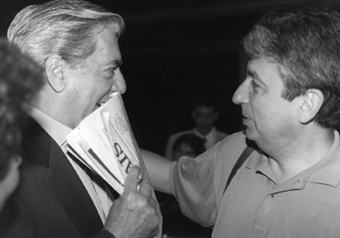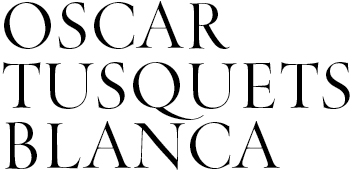Gauche Divine
Mario Vargas Llosa. Writer. Arequipa, Peru, 1936
In the 1970s I spent five years living in Barcelona, and I always look back on that period with fondness and nostalgia. While I was there, I read, learned and wrote a great deal, I met numerous interesting people and struck up friendships which have proved to be indestructible. The only thing I didn’t do during those years was share the rites, excesses and poses of what was known, with a mixture of envy, hatred, jealousy, admiration and disapproval, as the gauche divine or “divine left”. Who made up this group? A loose knot of writers, painters, architects, publishers, singers, film directors, advertising specialists, photographers and other assorted conspirators, generally from a high-class social background. What were they involved in? Various simultaneous revolutions which were mutually incompatible: socialism, anarchism, a confusion of all the senses, formal experimen-tation, cultural revolution, free love and success. / For me, Oscar was the personification of the gauche divine. / Although we didn’t see each other very often, whenever I did see him, I had a good time. His long hair upset the ladies and his Mohican moccasins, together with the ever-present bag dangling at his waist, were fitting accessories to his laid-back opinions, his frenzy, his pretensions and his spirit of contradiction. He clowned around at night, but he worked like a dog all day. According to our mutual fiend, Ricardo Muñoz Suay, to see Oscar dance was an extraordinary spectacle, like something out of a witches’ coven, a Sioux dance and a mystic trance. I never saw him dance, because the only night that I went to the Bocaccio discotheque, one of the gauche divine’s headquarters, he wasn’t there. / The frivolity, the rich kids’ dangerous games, it is true, were a large part of the gauche divine, but behind their effrontery and outlandish behaviour, there was a noble desire. For a different, better world, one which was much freer, of course, than the one they lived in under Franco’s dictatorship, but also more cultured, more spontaneous, with fewer prejudices and less stupidity, free from blinkers and bureaucrats, in which justice could go hand in hand with outspokenness, dissidence and fantasy, in which the exceptions were as important as the rules, in all fields: art, economics, politics, morality. / Of all the friends from those days who were in some way either in, or close to, the gauche divine, Oscar, who is so hard-working, so successful in his profession, so formal, is still, as far as I am concerned, the embodiment of that spirit which is now distant, weakened or extinct in all the others. In a way that is impossible not to admire, he has succeeded in welding his life and his work into an integrated, dissident, traditionalist, divisive alliance of contraries, always unexpected, elegant, innovative and, above all, free. / He is one of the few people who age well.








